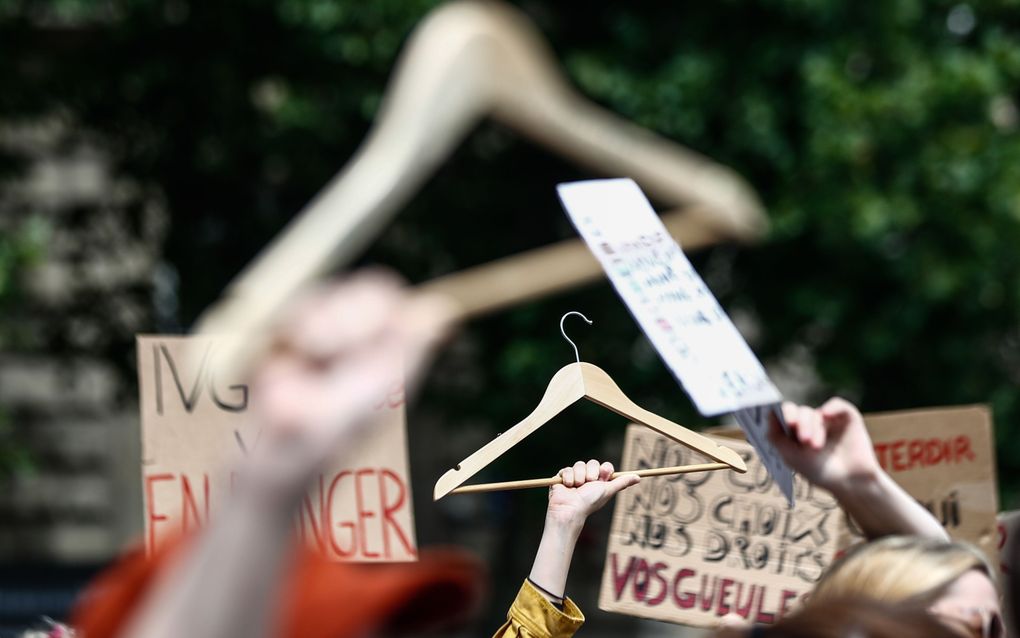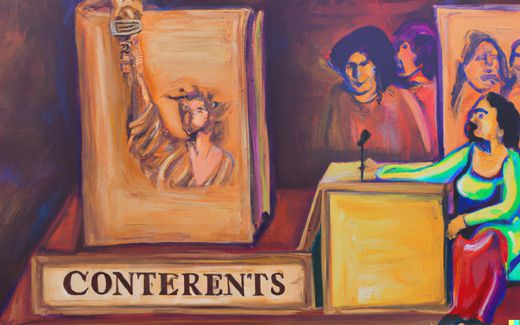"Enshrining abortion in the French constitution brings Europe to the brink of collapse"
28-02-2024
Western Europe
Arieke Smits-Lucas, RD

"European Christian values no longer have any meaning. Enshrinement of abortion into the French Constitution brings our continent to the brink of collapse." Photo EPA, Mohammed Badra
Western Europe
The French National Assembly, the French equivalent of the Lower House of Parliament, adopted a bill in January aimed at enshrining abortion in the Constitution. On Wednesday, it's the Senate's turn. A change in the law seems imminent.
In March of last year, French President Emmanuel Macron announced on X that "2024 will make women's right to abortion irreversible." In October, he concretised that statement by presenting a plan to the French Council of State to "enshrine women's freedom to resort to abortion in our constitution."
Abortion has been legal in France since 1975. The "Loi Veil," named after former Minister of Health Simone Veil, made abortion possible until ten weeks of gestation. Since 1975, the law has been amended several times. In 2001, the legal term for terminating a pregnancy increased from ten to twelve weeks; in 2022, it was extended from twelve to fourteen weeks.
On average, 15.4 out of 1000 women in France terminate their pregnancies, according to figures from the Dutch Fiom Foundation, an expertise centre in the field of unwanted pregnancy, kinship questions, and adoption, from 2020. This equates to 234,000 cases in 2022, the highest number in thirty years. In relative terms, only the United Kingdom and Sweden have higher figures in Europe. For comparison, in the same year, the number of abortions in the Netherlands was 8.9 per 1000 women. In the Czech Republic, where the number is the lowest, it was 2.8 per 1000 women.
Regression
According to French media, the proposal for the constitutional amendment is a response to the ruling in the high-profile Roe v. Wade case in 2022 in the United States. After the U.S. Supreme Court rejected a constitutional right to abortion, the debate flared up in France. Extreme-left parliamentarian Mathilde Panot submitted a proposal to the National Assembly to constitutionally establish the right to abortion to "protect France from regression."
After several amendments, the Senate also agreed, resulting in the proposal returning to the National Assembly. Both houses must agree for it to proceed to the next phase: a referendum.
Macron wants to avoid this referendum. Not only does it slow down the process, but it also gives the anti-abortion voice too much of a platform, according to the president. That's why he introduced a similar bill, thus circumventing a referendum.
Constitutional Amendment in France

In France, a constitutional amendment can be initiated by the parliament. For final approval, the bill must still be submitted to the people for a referendum.
An easier route, currently being pursued, is for the government to propose a constitutional amendment. If the French Council of State provides a positive opinion on it, the parliament votes on it. If both houses approve, a gathering of senators and parliamentarians in the Congress at Versailles will be convened. If a three-fifths majority is in favour of the proposal, the constitutional amendment will be enacted.
The Senate is currently involved in the current initiative. The vote is scheduled for Wednesday, February 28. The Congress meeting is scheduled for March 5. Still, if the Senate proposes an amendment, the bill will return to the National Assembly.
The initiative is also an attempt to prevent political unrest in the country. At the time the French president made his plan public, the newspaper Libération also wrote that Macron had not always been a staunch supporter of abortion. For instance, during his first term, he opposed the extension of abortion from twelve to fourteen weeks. The fact that the French president has completely reversed his position is a political manoeuvre, according to Franck Jullié, owner of a recruitment agency and active in the French pro-life movement. "It's a way for him to exert his power on the political spectrum and divert attention from other issues."
Moreover, his plans to enshrine the right to abortion do not come out of nowhere: in January 2022, he called for that right to be included in the Charter of Fundamental Rights of the European Union. And on March 8, 2023, International Women's Day, he promised to draft a law that would make a referendum unnecessary.
Liberal
The National Assembly adopted the bill in January with a large majority: only 30 out of 577 parliamentarians voted against it. Notably, all faction leaders voted in favour, including the far-right Marine Le Pen. This makes her more liberal than some of her supporters.
Whether a large majority will also be achieved in the Senate is uncertain. While the National Assembly is predominantly left-wing, the Senate is on the right side of the political spectrum. The Senate's reluctance is evident from a vote in 2022 when a similar law was considered. After several amendments, a narrow majority was eventually reached, with 166 votes in favour and 152 against.
Gérard Larcher, president of the Senate, opposes the proposal. "Abortion is not threatened in our country. Moreover, the Constitution is not a catalogue of social and societal rights," argued the elected representative of Les Républicains on the news channel Franceinfo.

According to Jullié, the Senate's reluctance also stems from the conscientious objections of healthcare providers. "While freedom of conscience for healthcare providers was guaranteed by the Loi Veil in 1975, there is no such clause now. This could make it impossible for doctors and midwives to refuse abortion. Although their concerns are present among senators, I strongly doubt whether they dare to advocate for them."
As the bill was passed with a large majority in the National Assembly, Jullié also expects no outright rejection of the law. However, he believes that an amendment could be proposed. By referring to "guaranteed freedom" rather than simply "access to the right to abortion" in the current bill, the National Assembly hopes to persuade the Senate in time.
What does a possible enshrinement mean for other countries? "Difficult to assess," says Jullié. "However, European Christian values no longer have any meaning. This law brings our continent to the brink of collapse."
Related Articles







